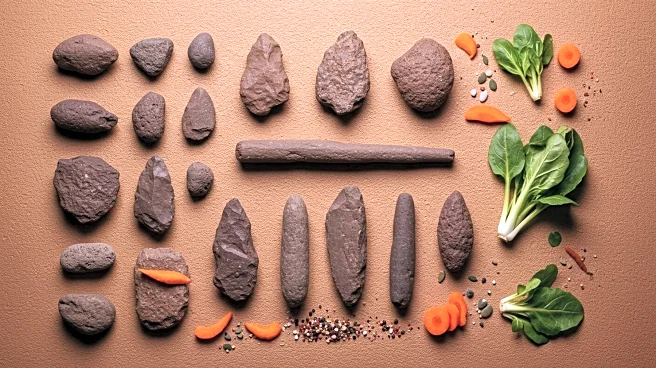What's Happening?
A recent study published in the journal Science has uncovered evidence that ancient humans consumed vegetables, using 300,000-year-old wooden tools found in Southwest China. These tools, discovered at the Early Paleolithic site in Gantangqing, were used for processing vegetables, specifically for digging up underground tubers. The tools contrast with the long, slender wooden spears from Schöningen, Germany, which were designed for hunting. Residue analysis on the tools confirmed their use in extracting underground plants, providing new insights into the dietary habits of early humans. The preservation of these tools is attributed to the unique environmental conditions at the site, which include oxygen-poor, water-saturated sandy clays that protected organic materials.
Why It's Important?
This discovery challenges the traditional view that ancient human diets were predominantly meat-based, highlighting the role of plant consumption in their survival. Understanding the dietary habits of early humans offers insights into their adaptability and resourcefulness, which are crucial for comprehending human evolution. The study suggests that ancient humans had knowledge of edible plants and their seasonality, indicating a sophisticated understanding of their environment. This broader perspective on ancient diets can influence current research on human evolution and dietary practices, potentially impacting fields such as anthropology and archaeology.
What's Next?
Further research may focus on exploring other sites with similar preservation conditions to uncover more evidence of plant consumption by ancient humans. Scientists might also investigate the cultural and social implications of these dietary practices, such as how knowledge of edible plants was shared and passed down through generations. Additionally, this study could prompt a reevaluation of existing theories on early human diets, leading to new hypotheses and research directions in paleoanthropology.
Beyond the Headlines
The findings highlight the importance of environmental factors in archaeological preservation, offering a rare glimpse into the plant-based aspects of ancient diets. This could lead to a deeper understanding of the ecological interactions between early humans and their habitats. The study also underscores the complexity of ancient human survival strategies, which involved a balance of hunting, gathering, and foraging, challenging simplistic narratives of early human life.









